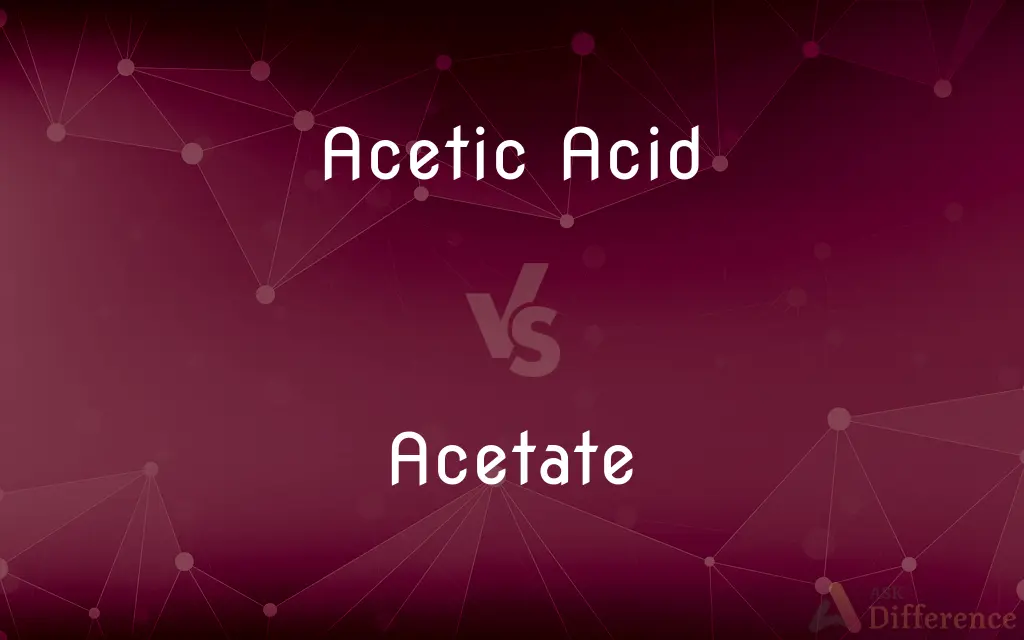Acetic Acid vs. Acetate — What's the Difference?
By Tayyaba Rehman — Published on January 15, 2024
Acetic acid is a weak organic acid (CH₃COOH), while acetate is its conjugate base (CH₃COO⁻) formed by losing a hydrogen ion.

Difference Between Acetic Acid and Acetate
Table of Contents
ADVERTISEMENT
Key Differences
Acetic acid, with the chemical formula CH₃COOH, is a weak organic acid best known as the main component of vinegar. It's characterized by a sour taste and pungent smell. Acetate, or CH₃COO⁻, is the ion or salt form of acetic acid, which forms when acetic acid donates a hydrogen ion (proton) in a solution, typically in a basic or neutral environment.
In terms of chemical properties, acetic acid is a polar, protic solvent and is partially ionized in an aqueous solution. It's used widely in the food industry as a preservative and flavoring agent and also has applications in the chemical industry. Acetate ions, on the other hand, are found in various compounds and are often used in biochemical applications, forming part of important processes like the Krebs cycle.
Acetic acid can be found in both liquid and vapor form under different conditions and has a strong, distinct vinegar-like smell. Acetate, being an ion, does not exist freely but is commonly found in the form of salts (like sodium acetate) or esters. These acetate compounds are often odorless and can have a range of applications from food additives to industrial solvents.
The production of acetic acid can occur through several methods, including bacterial fermentation or chemical synthesis. In contrast, acetate forms naturally in biological systems through metabolic processes or can be synthesized in the laboratory as part of chemical reactions involving acetic acid.
In summary, while acetic acid and acetate are chemically related, they differ in their forms, properties, and applications. Acetic acid is the acidic, proton-donating form, while acetate is the conjugate base, often forming part of salts and esters.
ADVERTISEMENT
Comparison Chart
Chemical Formula
CH₃COOH
CH₃COO⁻
State
Liquid or vapor form
Ion, part of compounds like salts or esters
Properties
Sour taste, pungent smell, weak acid
Typically odorless, conjugate base
Applications
Food preservatives, solvents, vinegar
Biochemical processes, industrial uses
Production
Bacterial fermentation, chemical synthesis
Formed from acetic acid in reactions
Compare with Definitions
Acetic Acid
Acetic acid is a weak organic acid, a key component of vinegar.
Acetic acid gives vinegar its characteristic sour taste.
Acetate
Acetate is the conjugate base of acetic acid.
In a basic solution, acetic acid forms acetate ions.
Acetic Acid
Acetic acid is used as a preservative in the food industry.
Acetic acid is added to pickles to prolong their shelf life.
Acetate
Acetate is often used in biochemical processes.
Acetate plays a crucial role in the metabolism of carbohydrates and fats.
Acetic Acid
Acetic acid is a polar, protic solvent.
Acetic acid can dissolve many organic compounds due to its polarity.
Acetate
Acetate forms part of compounds like sodium acetate.
Sodium acetate is used in heating pads, as it releases heat upon crystallization.
Acetic Acid
Acetic acid is partially ionized in an aqueous solution.
When dissolved in water, acetic acid partially ionizes to form acetate ions.
Acetate
Acetate compounds can be used as industrial solvents.
Ethyl acetate, an acetate ester, is commonly used as a solvent for nail polish removers.
Acetic Acid
Acetic acid has a distinct pungent smell.
The pungent smell of acetic acid is noticeable when opening a bottle of vinegar.
Acetate
Acetate is typically odorless.
Unlike acetic acid, sodium acetate does not have a strong smell.
Acetate
A salt or ester of acetic acid.
Acetate
Cellulose acetate or any of various products, especially fibers, derived from it.
Acetate
(organic chemistry) Any salt or ester of acetic acid.
Acetate
Cellulose acetate.
Acetate
A transparent sheet used for overlays.
Acetate
Ellipsis of acetate disc: a disc of aluminium covered in a wax used to make demonstration copies of a phonograph record.
Acetate
A salt formed by the union of acetic acid with a base or positive radical; as, acetate of lead, acetate of potash.
Acetate
A salt or ester of acetic acid
Acetate
A fabric made from cellulose acetate fibers
Common Curiosities
Is vinegar pure acetic acid?
No, vinegar contains about 5-8% acetic acid in water.
How is acetic acid used in food?
It's used as a flavoring agent and preservative.
Can acetic acid exist in vapor form?
Yes, acetic acid can be in vapor form under certain conditions.
What is acetate?
Acetate is the ion or salt form of acetic acid.
What are the properties of acetate?
Acetate is typically odorless and forms part of various compounds.
Is acetic acid harmful?
In high concentrations, it can be corrosive and irritating.
What is acetic acid?
Acetic acid is a weak organic acid known for its role in vinegar.
What role does acetate play in metabolism?
Acetate is involved in the Krebs cycle and metabolic processes.
How is acetate formed?
Acetate forms when acetic acid loses a hydrogen ion.
Can acetic acid be synthesized?
Yes, it can be chemically synthesized or produced through fermentation.
What are some uses of acetate in industry?
Acetate is used in solvents, plastics, and textile processing.
Where is acetate commonly found?
Acetate is found in biological systems and industrial compounds.
Is acetic acid a strong acid?
No, it's considered a weak acid.
How is acetate used in heating pads?
Sodium acetate in heating pads releases heat upon crystallization.
What is the difference in taste between acetic acid and acetate?
Acetic acid has a sour taste, while acetate salts are typically tasteless.
Share Your Discovery

Previous Comparison
IDE vs. SATA
Next Comparison
Redhat vs. UbuntuAuthor Spotlight
Written by
Tayyaba RehmanTayyaba Rehman is a distinguished writer, currently serving as a primary contributor to askdifference.com. As a researcher in semantics and etymology, Tayyaba's passion for the complexity of languages and their distinctions has found a perfect home on the platform. Tayyaba delves into the intricacies of language, distinguishing between commonly confused words and phrases, thereby providing clarity for readers worldwide.











































